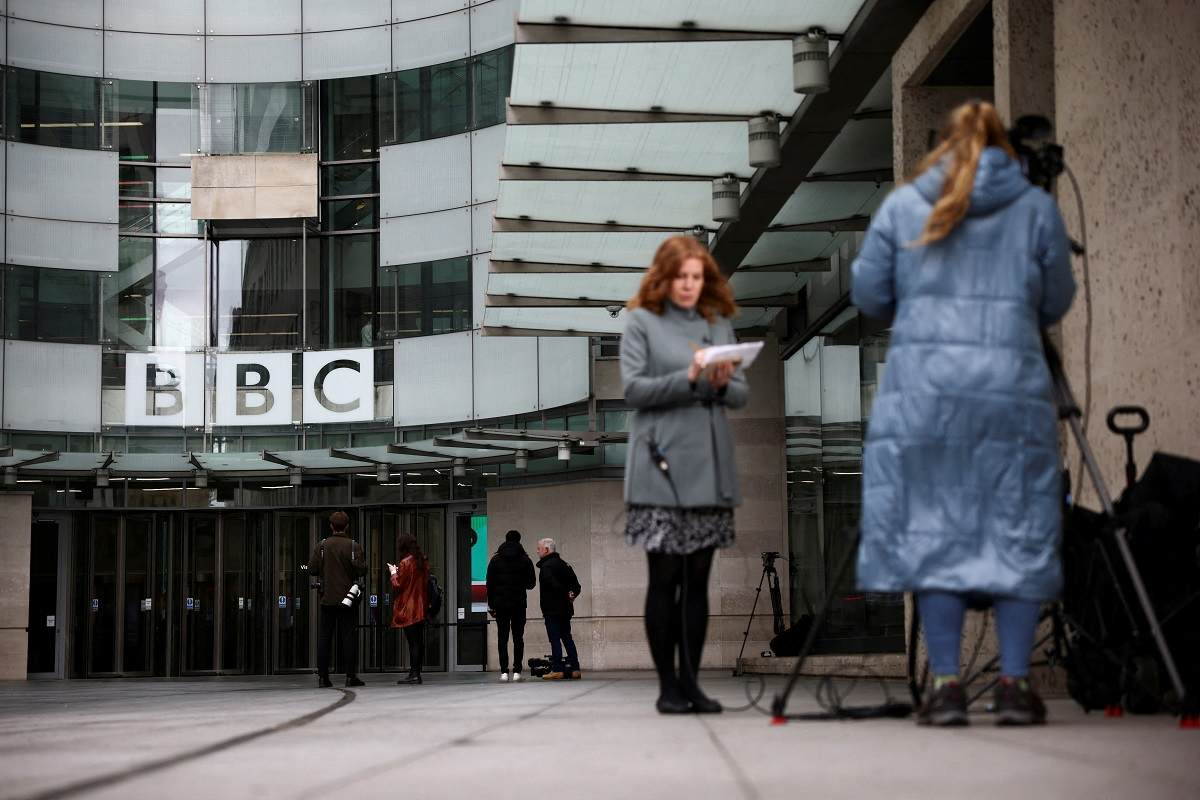
Members of the media work outside the BBC headquarters, in London, Britain April 28, 2023.
15:36 JST, June 15, 2023
Employees at the BBC office in Cairo went on strike Wednesday over the British public broadcaster’s insistence on paying staff in local currency, which has lost much of its value over the past year.
After more than a year of negotiations, most of the staff of nearly 90 in Egypt’s capital informed the BBC that they would strike for the day. Staff members said all but a handful of employees appeared to participate.
Informed by the company that only those planning to work could enter the office, many showed up anyway in defiance but refused to do their jobs, turning the action into a sit-down strike, BBC employees in Cairo told The Washington Post. The strike was not organized by a union.
Egypt is undergoing significant currency and economic crises. The shock waves from last year’s Russian invasion of Ukraine hit particularly hard in Egypt, a country that sourced the majority of its wheat imports from Russia and Ukraine, and struggled to pay for imported goods as global food prices soared. Year-on-year inflation last month neared 33 percent.
A $3 billion financial support package from the International Monetary Fund spread over nearly four years promised “a durable shift to a flexible exchange rate regime,” meaning the currency would be allowed to seesaw without interference.
Since the Ukraine invasion, the Egyptian government has sharply devalued its currency three times but failed to keep the pound’s value on the black market steady after each devaluation. The pound stood at 15.66 pounds to the dollar in March 2022; today its official value has halved, at 30.84 pounds to the dollar.
Since early this year, similar sporadic strikes have taken place in Egypt, including thousands of workers at a German cable manufacturer who were protesting a wage increase that was lower than promised a year earlier.
BBC staff members reached out to management last March, asking that they be paid in dollars, later suggesting a salary peg to the dollar, said a staff member, who like others spoke on the condition of anonymity because he was not authorized to speak to the news media. Management countered with a 5 percent salary hike, the first of a series of raises proposed. The latest proposal amounted to 27 percent, which includes an 8 percent bump last year.
A spokesman for the BBC said that the increase reflected a response to inflation.
“We are disappointed staff have continued to take strike action and are committed to working with them to find a resolution,” read a statement from the BBC, in response to questions sent by email. “We will continue to review the economic situation in Egypt, taking further action if required.”
Employees, many of whom work for the BBC’s Arabic service, who got paid around $1,200 a month last year now receive the equivalent of $500, the staff member said.
“We told the administration this is discrimination, clear discrimination,” he said, “and that they are doing this because in Egypt there’s suppression for press freedoms, and we are marked and can’t leave the BBC and go somewhere else to work because of the security conditions in the country.”
The suggested raises don’t “cover our losses,” said the employee, adding that the country is expecting another devaluation at the end of August, with many predicting the Egyptian pound would lose another third of its value.
Another BBC employee in Cairo said the company’s policy means “you are losing quality of life, you struggle to afford the basics.” They added that the currency devaluation, rather than inflation, is the bigger concern.
The BBC faced a similar issue with its Turkey operations last year, when its Istanbul bureau went on strike and stood in the biting January cold for two weeks, protesting the BBC’s pay raise offer, which was significantly lower than rising inflation levels in Turkey. The strike ended after new financial terms were reached.
Staff members in the Cairo office of the BBC, which it says is its largest in the Middle East, for the most part appear to have opted to stay at home or participate in the sit-down strike, streaming into the office Wednesday but abstaining from using their company devices. For most, the stakes are high: Their salaries barely cover their living expenses, and quitting to take another media job is not an option for the Egyptian-majority staff.
“There is an enmity between the BBC and authorities in Egypt,” said the staff member who spoke about press freedoms in Egypt. “Any journalist that worked with the BBC” will not get hired.
Egypt has long faced criticism over its suppression of journalism. Pluralism is “almost nonexistent,” media watchdog Reporters Without Borders says. Independent media is censored and targeted by state prosecutors, and “virtually all media are directly controlled by the state,” its snapshot of the country finds.
The employee also raised another long-standing issue in Egypt: Suspicion abounds over the possibility that official inflation numbers do not reflect the reality. Since last March, the price of rice has tripled, milk and eggs have doubled, and meat has become a luxury. In March, the BBC reported that the government had suggested that Egyptians start cooking chicken feet – “a protein-rich part of the bird usually reserved as scraps for dogs and cats.”
Top Articles in News Services
-

Survey Shows False Election Info Perceived as True
-

Hong Kong Ex-Publisher Jimmy Lai’s Sentence Raises International Outcry as China Defends It
-

Japan’s Nikkei Stock Average Touches 58,000 as Yen, Jgbs Rally on Election Fallout (UPDATE 1)
-

Japan’s Nikkei Stock Average Falls as US-Iran Tensions Unsettle Investors (UPDATE 1)
-

Trump Names Former Federal Reserve Governor Warsh as the Next Fed Chair, Replacing Powell
JN ACCESS RANKING
-

Producer Behind Pop Group XG Arrested for Cocaine Possession
-

Japan PM Takaichi’s Cabinet Resigns en Masse
-

Man Infected with Measles Reportedly Dined at Restaurant in Tokyo Station
-

Israeli Ambassador to Japan Speaks about Japan’s Role in the Reconstruction of Gaza
-

Videos Plagiarized, Reposted with False Subtitles Claiming ‘Ryukyu Belongs to China’; Anti-China False Information Also Posted in Japan

























